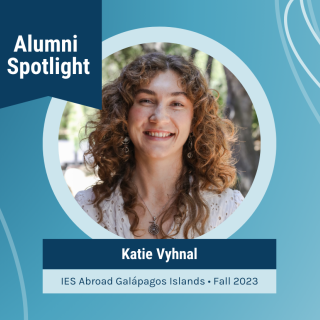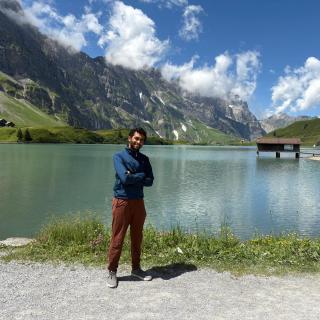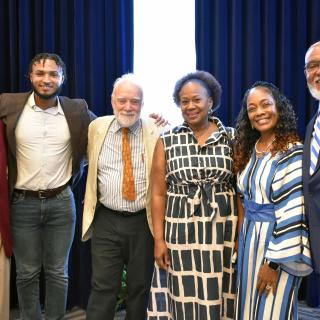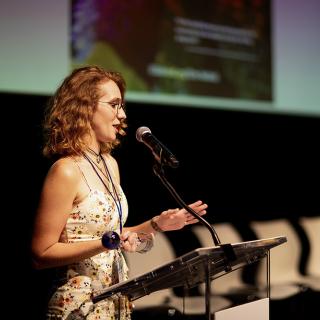
After studying abroad, Lee Brudvig (IES Abroad Vienna, 1975-76) returned to Vienna as a Fulbright student and met his future wife, Helen. Then, after a move to New York City and a successful career on Wall Street, Lee quickly became restless and transitioned into the U.S. Foreign Service. After serving in 12 locations from Africa to Europe to Asia with his family in tow, Lee came full circle for his final post as Deputy Chief of Mission at the U.S. Embassy in Vienna. Now heading into retirement, Lee looks back at the defining moments of his career of 32 years and how study abroad played an important role in his journey.
IES Abroad: Why did you choose to study in Vienna?
Lee Brudvig: I was a student at Gustavus Adolphus College in southern Minnesota and had little international experience. I was curious about other cultures and wanted to expand my horizon by living abroad. Vienna, at the time, was at the eastern edge of Europe and offered a multi-cultural opportunity in a country with a long and rich history.
IES Abroad: How did studying abroad influence you, both professionally and personally?
LB: I was able to see the United States from an entirely new perspective that enriched my understanding not only of Europe and the world, but of the role of the United States in the world—culturally, politically, and economically. I had the opportunity to get to know a lot of Austrians and fellow students from across the United States. This built a strong foundation for a future life and career in the Foreign Service. 
IES Abroad: What are some of your greatest study abroad memories?
LB: My most distinct memories are the sensory impact of the landscapes as well as the music, art, and culture that I experienced with friends and the energy of the time. The images and sounds are as fresh now as then: the Vienna State Opera, stunning works of art, the Ringstrasse buildings, Wiener Schnitzel that spilled over the plate, and alpine skiing. I remain in close contact with many of my friends from this time. Many of us have children and grandchildren with whom we can share the remarkable IES Abroad experiences.
IES Abroad: You returned to Vienna as a Fulbright student and went on to start a successful career in finance. What led you to change course and pursue a career in the U.S. Foreign Service?
LB: After working in an executive position for a large bank on Wall Street for a few years, I started to get restless. When I was a Fulbright student in Vienna, I had found a soul mate, Helen, who shared my curiosity and desire for adventure. Her mother was from Vienna, but she was raised in South Africa. We both spoke German and enjoyed learning languages, and we wanted to get beyond a life in New York that was becoming too confining and predictable. The decision to leave Wall Street came suddenly when a friend in the bank observed one day that “your shoes are shinier than my shoes today”. I realized we both were wearing the same pin stripe suit and red tie and only the glean of my shoes set me apart. I decided at that moment, “I’m out of here!”
IES Abroad: What was your first overseas assignment?
LB: Our first overseas post was Manila at a very tumultuous time. We arrived just after the assassination of Benigno Aquino in 1984 and experienced the lead up to the “People Power Revolution” that deposed Ferdinand Marcos and swept Mrs. Aquino into power in a dramatic change of course. I was closely involved in political reporting and election monitoring and learned how important it is to care for all segments of society if a country is to maintain its stability and prosperity.
IES Abroad: You went on to serve all over the world from Nairobi to New Delhi to Guangzhou. What are some of your most memorable experiences?
LB: I recall most vividly a few turning points (“Sternsstunden”) that changed the course of events in the world: the fall of the Berlin Wall, Tiananmen Square, the election of President Nelson Mandela, the renaissance of relations between India and the United States as the world’s largest and oldest democracies, and the post-election violence in Kenya that ushered in the need for a new constitution. I also recall many experiences with Helen and our children as we explored new countries and cultures.
IES Abroad: How did you prepare for each new post?
LB: I am basically a nerd at heart and loved nothing more than reading anything I could get my hands on about new postings and finding knowledgeable people to inform me. The State Department does a superb job in language training and country/regional orientation. I did a year sabbatical at Yale University studying development economics and two years at the Foreign Service Institute studying Mandarin Chinese. Such in-depth preparation is essential to be successful when immersed in a foreign culture with the goal of building lasting relationships based on mutual understanding and enlightened self-interest.
IES Abroad: Tell us about your most recent role as Deputy Chief of Mission at the U.S. Embassy in Vienna. What did you love most about being back in Vienna?
LB: What I most loved about returning to Austria as Deputy Chief of Mission (equivalent to Deputy Ambassador) was being able to witness a new Austria at the heart of a united Europe. I experienced a changing Europe, still struggling to define itself and its role in the international community. I was dismayed at the damage done to U.S.-European relations by the Iraq War and NSA activities, and I worked very hard to dramatize the vital and enduring nature of the transatlantic relationship as a pillar of global stability and prosperity. With the invasion of the Ukraine by Russia, the specter of the Cold War raised its dark head again and catalyzed a rethinking of East-West relations. I resurrected a speech I had done 20 years earlier, just after the fall of the Berlin Wall, to rekindle a vision of U.S.-European strength based on the “Triple Crown” institutions of the North Atlantic Treaty Organization, the Organization for Security and  Cooperation in Europe, and the European Union. I also spoke very extensively in support of the proposed “Trans-Atlantic Trade and Investment Partnership” as a mechanism to further strengthen the U.S.-European economic partnership and spark the growth needed to keep Europe whole, free, and united.
Cooperation in Europe, and the European Union. I also spoke very extensively in support of the proposed “Trans-Atlantic Trade and Investment Partnership” as a mechanism to further strengthen the U.S.-European economic partnership and spark the growth needed to keep Europe whole, free, and united.
IES Abroad: Now that you are heading into retirement, what’s next?
LB: I always told Helen that if she accompanied me going all over the world on the diplomatic merry-go-round, I would take her home to South Africa when we retire. Well, after 32 years in the Foreign Service involving nothing less than 13 international moves, I made good on my promise, and we are now settling into our new home in Cape Town, South Africa, surrounded by mountains, the ocean, and vineyards. I am excited to help our children as they pursue their dreams. In a globalized world, they face a much bigger challenge and more competition than I did at their age. I might do some short-term consulting and humanitarian work in Africa, but mostly, I look forward to doing some writing, public speaking, and mentoring young people.
To learn more, watch his retirement video: "Lee Brudvig: A Man for All Seasons."




